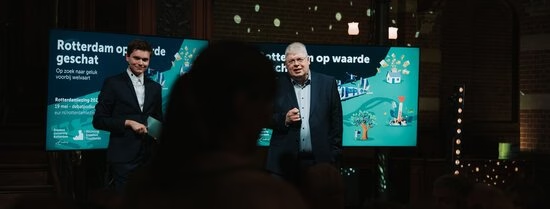When people hear the word prosperity, many people think of money. And of rich people with a good job and a big house. But professor Frank van Oort thinks we should look at prosperity differently. According to him, prosperity is actually the quality of life. He explained this further during the Rotterdam lecture.
You hear the term "broad prosperity" more and more often, especially in government. But what exactly does it mean? Broad prosperity is about people's well-being. So it's not just about money. Health, unemployment, education, safety, happiness, housing, the environment and job security also play a role.
However, the way of looking at broad prosperity differs per person and per institution. What is most important? Or is everything equally important? According to Van Oort, you can divide broad prosperity into three components: social, sustainability and economy. 'You weigh up interests between these components', he says. 'For example: you choose more social assistance and less attention to economic growth. We call that trading off. It is often a political choice. In the US, president Trump chooses more economy and less sustainability. In Europe, we do it the other way around.'

Weighing up interests has consequences: 'Sometimes it also costs money. I recently bought a refrigerator that would have been three times as expensive if it had been made in a sustainably. I can afford this, but people with less money cannot. That creates more inequality. That is also a trade-off. What do you find more important? A better environment or a fairer distribution of costs?'
Aftermovie

A metro line between Rotterdam and The Hague
An example of investing in broad prosperity is the metro line between Rotterdam and The Hague (E-line). This metro was built so that more people can travel easily. 'Every day, the metro is full of people who would otherwise take the car. That is good for the environment. And people from Rotterdam-Zuid can work and travel to The Hague more easily. Houses along the E-line have also become 70 euros more expensive per square meter than comparable houses elsewhere. If you add that up, you could have paid for the entire E-line with that. So that is also worth a lot from an economic point of view', says Van Oort.
So many advantages! Then it seems obvious to build a metro line to more cities. Howver, it is not that simple. 'The metro line is intended to make transport more accessible. But because houses along the line have become more expensive, poorer people can no longer buy a house there. So the metro line has both advantages and disadvantages.'

What makes people happy?
As previously stated, broad prosperity requires more than just money. It is about safety, job opportunities, living environment, health, life expectancy, happiness. Rotterdam is at the bottom of many broad prosperity lists. But if we link the dimensions to appreciation, Rotterdam is at the top.
'Rotterdammers find a job more important than nature. They are happy with what they can achieve. That is important to see. Where do people live? Where do they work? How do they travel? And what do they think about that? Let us create a good model for that, so that everything is included in a proportional way. That is the best way to stimulate broad prosperity', Van Oort concludes.
Watch the full broadcast back

- Professor
- More information
Press
For more information, please contact Ronald de Groot, Media and Public Relations Officer at Erasmus School of Economics via rdegroot@ese.eur.nl, or +31 6 53 641 846.- Related content

